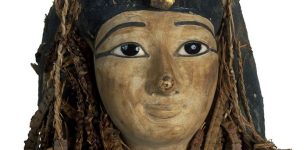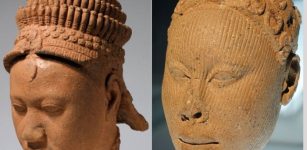Tantalus – Greek King And Evildoer Who Violated Divine Laws And Was Sent To Tartarus
A. Sutherland - AncientPages.com - In ancient Greek mythology, there are many heroes who could be credited with good deeds, glorifying the Olympian gods and them as well. But, as a rule, all good things have their opposites.
The myth of the arrogant Tantalus, the son of Zeus, and a nymph Pluto, daughter of Rhea and Cronus, is an interesting and, at the same time, terrible story that can attest to these opposites.
In Greek mythology, Tantalus was the son of Zeus. As one of Zeus’ favorites, Tantalus was received as a guest at the table of the gods, especially as it was a custom to invite chosen mortals to the feasts of the gods residing on Mount Olympus.
Tantalus' punishment. Image via mythology.wiki
Tantalus was the legendary and wealthy king of Sipylus who often invited the gods to his residence.
Ancient sources, such as that by the Greek travel writer Pausanias (110 – c. 180 AD), state that Tantalus’ city was believed to be situated at Mt. Sipylus, not far from Izmir (Smyrna) on the Aegean coast.
Tantalus’ Misbehavior Annoyed The Olympian Gods
The ruler of Sipylus could live an honorable life in his kingdom. As the son of Zeus, he was expected to demonstrate appropriate behavior, but he could not or perhaps did not want to. Surrounded by many mortal friends, Tantalus wanted to impress them.
His bad nature was definitely against him. Additionally, he did not act according to the rules because he wanted to fool the gods and take advantage of the gods’ friendliness and trust they offered him.
Zeus was the supreme god in the Greek pantheon and to violate his domain in any way, was considered the greatest offense one could do.
Generally, the Greek myths (and others, too) punish all, even lesser gods, who do not show enough respect, obedience, and reverence for the gods, especially the superior ones.
Many Misdeeds Of Tantalus That Cost Him Much
Tantalus revealed the secrets of the gods to mortals and passed them divine nectar and ambrosia, giving immortality or longevity to those who consumed it.
However, stealing these precious items and revealing the gods’ table talks were not his only sins.
One version of this story says that Tantalus was blamed for indirectly stealing the golden dog from Zeus's shrine in Crete. The dog was created by Hephaestus (god of metals and smithing) for Rhea to watch over infant Zeus. Tantalus's friend Pandareus stole the dog and gave it to him for safekeeping. When Tantalus was later asked to return the dog, he denied that he had it, saying he "had neither seen nor heard of a golden dog."
Tantalus’ Final Crime And Penalty That Never Ceased
Tantalus had a wicked nature, which manifested itself when he invited the gods to a banquet, at which he served them up his son Pelops boiled in a cauldron.
All the gods withheld from this horrible meal. Only the goddess of the harvest, Demeter, ate a piece of Pelop's shoulder. Grieving for her daughter Persephone, abducted by Hades, she was lost in her thoughts and completely unaware of what she was eating.
Tantalus by Joseph Heinz the Elder, 1535. Image source /wikipedia
Tantalus wanted to test the gods; he wanted to see if they would know what exactly was served to them.
Was his action the first sign of his weakening faith in the omnipotence of the gods?
At the command of Zeus, Pelops was brought back to life and his shoulder was replaced with one of ivory made for him by Hephaestus. Tantalus was eventually condemned for his misdeeds and his punishment is described in the ‘Odyssey’, one of two major ancient Greek epic poems attributed to Homer.
There are also many other versions of Tantalus’ story that present his penalty differently. According to some, the gods placed a boulder above Sipylus, which could fall at any moment. According to others, Tantalus was condemned to eternal hunger and thirst in Tartarus, the prison beneath the underworld.
He was placed thirsty in a pool of water, which drained away when he tried to drink it. Likewise, delicious fruits placed above his head, eluded him all the time, remaining beyond his reach, when he tried to eat some of them. Thus, Tantalus was deprived of nourishment forever and his punishment would never cease.
Punishment That Continued Through Generations
Tantalus’ very serious transgressions cursed his family for several generations to come. His children’s children were fated to commit diverse bizarre and unacceptable acts, including incest, fratricide, and cannibalism, just to name a few. Tantalus’ daughter, Niobe, had her children all killed by Apollo and Artemis because she boasted her superiority to their mother, Leto.
"To Pelops two sons were born, Atreus and Thyestes. The inheritance of evil descended to them in full force. Thyestes fell in love with his brother’s wife and succeeded in making her false to her marriage vows. Atreus found out and swore that Thyestes should pay as no man ever had. He killed his brother’s two little children, had them cut limb from limb, boiled, and served up to their father....
When he had eaten - "poor wretch, when he had learned the deed abhorrent, He cried a great cry, falling back—spewed out That flesh, called down upon that house a doom Intolerable, the banquet board sent crashing. Atreus was King. Thyestes had no power.
The atrocious crime was not avenged in Atreus’ lifetime, but his children and his children’s children suffered..." (Edith Hamilton Mythology: Timeless Tales of Gods and Heroes).
This turbulent family committed numerous acts against the gods’ rules and nature.
Updated on August 17, 2024
Written by – A. Sutherland - AncientPages.com Senior Staff Writer
Copyright © AncientPages.com All rights reserved. This material may not be published, broadcast, rewritten or redistributed in whole or part without the express written permission of AncientPages.com
Expand for referencesReferences:
James P, Nick Thorpe N. Ancient Mysteries
More From Ancient Pages
-
 Mummy Of Pharaoh Amenhotep I Digitally Unwrapped For The First Time In 3,000 Years
Archaeology | Dec 30, 2021
Mummy Of Pharaoh Amenhotep I Digitally Unwrapped For The First Time In 3,000 Years
Archaeology | Dec 30, 2021 -
 New Path For Early Human Migrations Contradicts A Single ‘Out Of Africa’ Theory
Evolution | Oct 5, 2023
New Path For Early Human Migrations Contradicts A Single ‘Out Of Africa’ Theory
Evolution | Oct 5, 2023 -
 Mystery Of The Marble Lions On The Sacred Island Of Delos Solved?
Archaeology | Oct 12, 2021
Mystery Of The Marble Lions On The Sacred Island Of Delos Solved?
Archaeology | Oct 12, 2021 -
 Are Relics In Santi Apostoli Church Really The Remains Of St. James And St. Philip?
Fossils | Feb 8, 2021
Are Relics In Santi Apostoli Church Really The Remains Of St. James And St. Philip?
Fossils | Feb 8, 2021 -
 Mystery Of Human Evolution – What Can Ancient Genes Tell Us About Who We Are?
Archaeology | Jun 2, 2022
Mystery Of Human Evolution – What Can Ancient Genes Tell Us About Who We Are?
Archaeology | Jun 2, 2022 -
 Ife Head: Significance Of The Head ‘Ori’ In Yoruba Ancient And Present Beliefs
Artifacts | Mar 27, 2019
Ife Head: Significance Of The Head ‘Ori’ In Yoruba Ancient And Present Beliefs
Artifacts | Mar 27, 2019 -
 Solar Eclipses And New Attempt To Date Homer’s Iliad And Odyssey
Myths & Legends | Jan 7, 2016
Solar Eclipses And New Attempt To Date Homer’s Iliad And Odyssey
Myths & Legends | Jan 7, 2016 -
 Baffling Archaeological Find At George Washington’s Mount Vernon
Archaeology | Jun 20, 2024
Baffling Archaeological Find At George Washington’s Mount Vernon
Archaeology | Jun 20, 2024 -
 Fenja And Menja: Two Giant Sisters, Magical Grotte Mill And Why The Sea Is Salt
Featured Stories | Feb 15, 2020
Fenja And Menja: Two Giant Sisters, Magical Grotte Mill And Why The Sea Is Salt
Featured Stories | Feb 15, 2020 -
 On This Day In History: Teotihuacan’s Warlord Siyaj K’ak’ Conquers Tikal – On Jan 16, 378
News | Jan 16, 2017
On This Day In History: Teotihuacan’s Warlord Siyaj K’ak’ Conquers Tikal – On Jan 16, 378
News | Jan 16, 2017 -
 Coventry’s Mysterious Ogham Stone Displayed At Herbert Art Gallery And Museum
Archaeology | May 18, 2024
Coventry’s Mysterious Ogham Stone Displayed At Herbert Art Gallery And Museum
Archaeology | May 18, 2024 -
 Scientists Question Whether Meat Eating Really Changed Human Evolution
Archaeology | Jan 25, 2022
Scientists Question Whether Meat Eating Really Changed Human Evolution
Archaeology | Jan 25, 2022 -
 ‘Our Way Model’ Reveals How First Anatomically Modern Humans Populated Europe
Human Beginnings | Oct 7, 2024
‘Our Way Model’ Reveals How First Anatomically Modern Humans Populated Europe
Human Beginnings | Oct 7, 2024 -
 On This Day In History: Battle Of Nineveh Was Fought – On Dec 12, 627 AD
News | Dec 12, 2016
On This Day In History: Battle Of Nineveh Was Fought – On Dec 12, 627 AD
News | Dec 12, 2016 -
 Roman Sexuality Was Far More Complex Than Simply Gay Or Straight – Pompeii’s House Of The Vettii Reveals Why
Featured Stories | Jan 24, 2023
Roman Sexuality Was Far More Complex Than Simply Gay Or Straight – Pompeii’s House Of The Vettii Reveals Why
Featured Stories | Jan 24, 2023 -
 Blame The Neanderthals For Your Lower Back Pain – Scientists Say
Archaeology | Mar 8, 2022
Blame The Neanderthals For Your Lower Back Pain – Scientists Say
Archaeology | Mar 8, 2022 -
 Rare Discovery: Giant Stone Artifacts Found On Ice Age Site In Kent
Archaeology | Jul 6, 2023
Rare Discovery: Giant Stone Artifacts Found On Ice Age Site In Kent
Archaeology | Jul 6, 2023 -
 Rare ‘Polishing Boulder’ Used By Stone Age People Found In Dorset, UK
Archaeology | Aug 26, 2023
Rare ‘Polishing Boulder’ Used By Stone Age People Found In Dorset, UK
Archaeology | Aug 26, 2023 -
 Has Yorkshire’s Lost Underwater Town Ravenser Odd Finally Been Found?
News | Mar 26, 2022
Has Yorkshire’s Lost Underwater Town Ravenser Odd Finally Been Found?
News | Mar 26, 2022 -
 Advanced Ancient Technology: Could Ancient Peruvians Soften Stone?
Ancient Technology | May 7, 2015
Advanced Ancient Technology: Could Ancient Peruvians Soften Stone?
Ancient Technology | May 7, 2015


